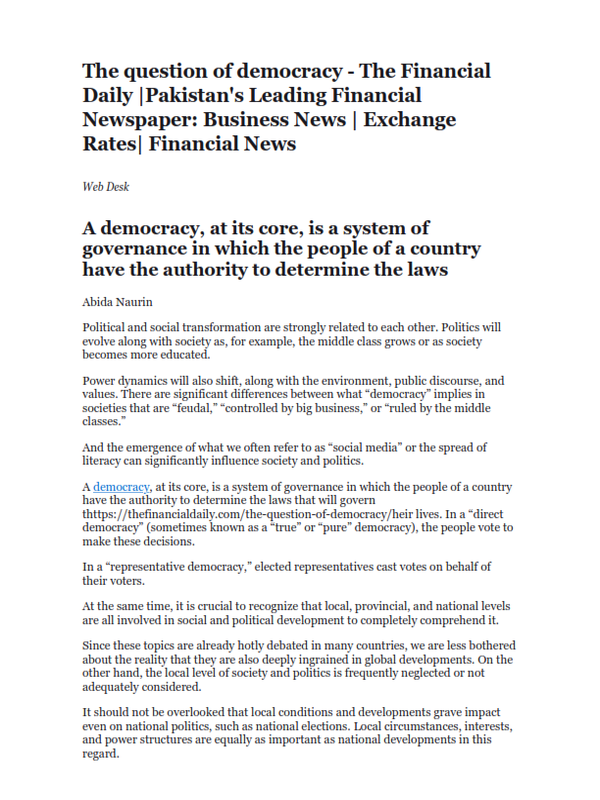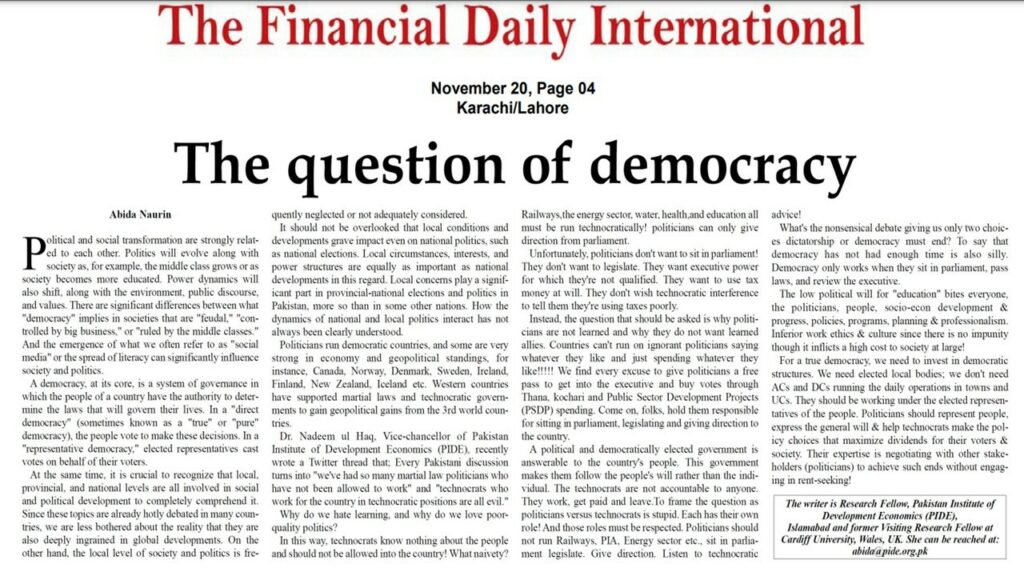
Pakistan Institute of Development Economics
- Home
Our Portals
MenuMenuMenuMenuMenuMenuMenu - ResearchMenuMenuMenuMenuMenuMenuMenu
- Discourse
- The PDR
- Our Researchers
- Academics
- Degree Verification
- Thesis Portal
- Our Portals
The question of democracy
A democracy, at its core, is a system of governance in which the people of a country have the authority to determine the laws
Political and social transformation are strongly related to each other. Politics will evolve along with society as, for example, the middle class grows or as society becomes more educated.
Power dynamics will also shift, along with the environment, public discourse, and values. There are significant differences between what “democracy” implies in societies that are “feudal,” “controlled by big business,” or “ruled by the middle classes.”
And the emergence of what we often refer to as “social media” or the spread of literacy can significantly influence society and politics.
A democracy, at its core, is a system of governance in which the people of a country have the authority to determine the laws that will govern thttps://thefinancialdaily.com/the-question-of-democracy/heir lives. In a “direct democracy” (sometimes known as a “true” or “pure” democracy), the people vote to make these decisions.
In a “representative democracy,” elected representatives cast votes on behalf of their voters.
At the same time, it is crucial to recognize that local, provincial, and national levels are all involved in social and political development to completely comprehend it.
Since these topics are already hotly debated in many countries, we are less bothered about the reality that they are also deeply ingrained in global developments. On the other hand, the local level of society and politics is frequently neglected or not adequately considered.
It should not be overlooked that local conditions and developments grave impact even on national politics, such as national elections. Local circumstances, interests, and power structures are equally as important as national developments in this regard.
Local concerns play a significant part in provincial-national elections and politics in Pakistan, more so than in some other nations. How the dynamics of national and local politics interact has not always been clearly understood.
Politicians run democratic countries, and some are very strong in economy and geopolitical standings, for instance, Canada, Norway, Denmark, Sweden, Ireland, Finland, New Zealand, Iceland etc.
Western countries have supported martial laws and technocratic governments to gain geopolitical gains from the 3rd world countries.
Dr. Nadeem ul Haq, Vice-chancellor of Pakistan Institute of Development Economics (PIDE), recently wrote a Twitter thread that;
Every Pakistani discussion turns into “we’ve had so many martial law politicians who have not been allowed to work” and “technocrats who work for the country in technocratic positions are all evil.”
Why do we hate learning, and why do we love poor-quality politics?
In this way, technocrats know nothing about the people and should not be allowed into the country! What naivetycians can only give direction from parliament.
Unfortunately, politicians don’t want to sit in parliament! They don’t want to legislate. They want executive power for which they’re not qualified. They want to use tax money at will. They don’t wish technocratic interference to tell them they’re using taxes poorly.
Instead, the question that should be asked is why politicians are not learned and why they do not want learned allies. Countries can’t run on ignorant politicians saying whatever they like and just spending whatever they like!!!!!.
We find every excuse to give politicians a free pass to get into the executive and buy votes through Thana, kochari and Public Sector Development Projects (PSDP) spending. Come on, folks, hold them responsible for sitting in parliament, legislating and giving direction to the country.
A political and democratically elected government is answerable to the country’s people. This government makes them follow the people’s will rather than the individual. The technocrats are not accountable to anyone.
They work, get paid and leave.To frame the question as politicians versus technocrats is stupid.
Each has their own role! And those roles must be respected. Politicians should not run Railways, PIA, Energy sector etc., sit in parliament legislate.
Give direction. Listen to technocratic advice!
What’s the nonsensical debate giving us only two choices dictatorship or democracy must end? To say that democracy has not had enough time is also silly. Democracy only works when they sit in parliament, pass laws, and review the executive.
The low political will for “education” bites everyone, the politicians, people, socio-econ development & progress, policies, programs, planning & professionalism. Inferior work ethics & culture since there is no impunity though it inflicts a high cost to society at large!
For a true democracy, we need to invest in democratic structures. We need elected local bodies; we don’t need ACs and DCs running the daily operations in towns and UCs.
They should be working under the elected representatives of the people. Politicians should represent people, express the general will & help technocrats make the policy choices that maximize dividends for their voters & society.
Their expertise is negotiating with other stakeholders (politicians) to achieve such ends without engaging in rent-seeking!? Railways,the energy sector, water, health,and education all must be run technocratically! politi




